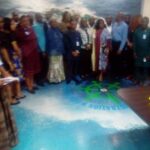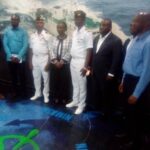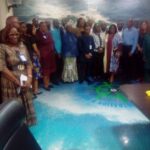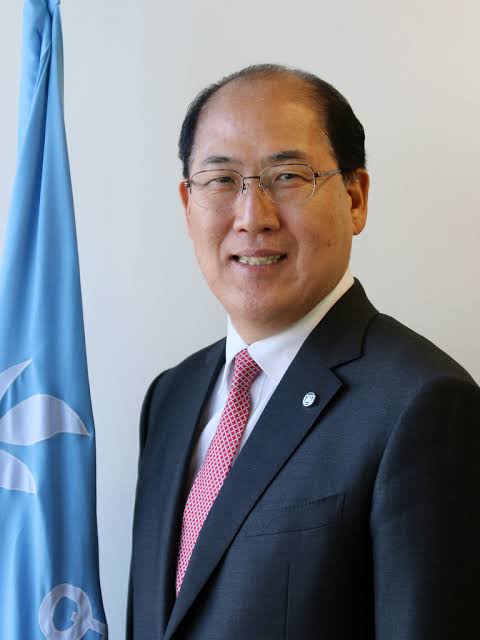NIMASA, Ghana Maritime Authority Set To Partner On Effective Cabotage Operations: By Prince Davies Benson


 The Nigerian Maritime Administration and Safety Agency (NIMASA) and the Ghana Maritime Authority (GMA) have expressed their willingness and readiness to collaborate on ways and means of ensuring that both countries achieve effective Cabotage regimes in their maritime administrations.
The Nigerian Maritime Administration and Safety Agency (NIMASA) and the Ghana Maritime Authority (GMA) have expressed their willingness and readiness to collaborate on ways and means of ensuring that both countries achieve effective Cabotage regimes in their maritime administrations.
This was disclosed by the Director General of NIMASA, Dr. Bashir Jamoh in his keynote address during the visit of a delegation of the Ghana Maritime Authority to understudy Nigeria’s Cabotage regime.
Jamoh, who welcome his Ghana counterparts to Nigeria to understudy the country’s Cabotage operations, said: “While we understand that the period might be too short for you to understand the totality of our operations as it relates to our Cabotage regime, this would form a platform for the and NIMASA to continue to engage on how to strengthen this protectionist approach towards building indigenous capacity for the maritime sectors of both countries.
“Furthermore, your visit to understudy us cannot come at a better time as the President of Ghana, Nana Akuffo-Ado recently convened an extraordinary session of the heads of state and government of the Gulf of Guinea Commission in Accra where President Muhammadu Buhari gave a keynote address on “strategies for strengthening peace and security in the fight against maritime-related crimes in the region.”
Maintaining that the visit demonstrated the importance both countries attach to the maritime industry as a catalyst for the development of their economies, Jamoh pointed out that it was necessary for the two nations to continue to engage occasionally to enable them to share ideas on how to collectively assist their maritime administrations in achieving their core mandates, thereby ensuring global best practices in the affairs of the Gulf of Guinea (GoG) maritime domain.
“As a regulatory and enforcement agency, we are committed to ensuring that our core mandates are accomplished in such a manner that will provoke economic development for Nigeria while growing indigenous capacity in line with international best practices.
“I am sure at some point you might all have read about the Coastal and Inland Shipping (Cabotage) Act 2003, which came into force in Nigeria in 2004 and it is essentially a local capacity-building law. Its major aim is to empower Nigerians for greater participation in maritime trade. This law is based on four key pillars of ensuring that vessels that operate in coastal waters within the country’s territory are built in Nigeria, owned by Nigerians, manned by Nigerians and registered in Nigeria,” he stated.
He also assured the visiting team that Nigeria has experienced human resources to take them through the rudiments of the Cabotage regime, which will help them to replicate the same milestones being recorded in the Nigerian maritime industry in Ghana.
Speaking further, he said there has been an increase in the number of local participation in Nigeria’s maritime domain since the advent of the Cabotage Act as about 68 per cent of vessels trading within the country’s maritime space are Nigerian-flagged, a development he said, showed that NIMASA has been doing a lot in ensuring that proper attention is paid to the essence of the Cabotage mandate.
Citing the Cabotage Vessel Financing Fund (CVFF), he explained that the CVFF is a special fund that is basically obtained through the collection of a 2 per cent surcharge from the total contract sums performed by any vessel engaged in Cabotage trade.
“The fund shall be utilised to offer financial assistance and create access to funding by financial institutions with the aim of increasing indigenous ship acquisition capacity for qualified Nigerians. The understudy and consequent replication of this element of our Cabotage regime shall help your country to fund indigenous ships and the acquisition of other maritime assets.
“Laws can be made, but the most important thing for a law to be effective is enforcement. So, you will be introduced to how we enforce compliance in relation to our Cabotage activities. This would guide you towards growing indigenous capacity in your maritime space and indeed the African maritime region,” he added.
 The New Experience Newspapers Online News Indepth, Analysis and More
The New Experience Newspapers Online News Indepth, Analysis and More
